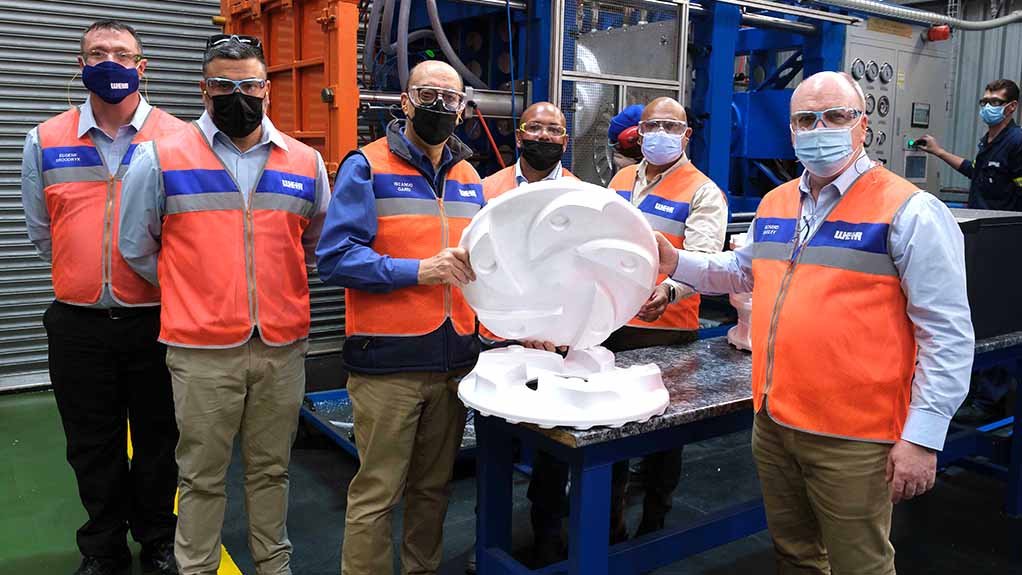Locally developed casting innovation


Polystyrene beads are expanded to create moulds at Weir Minerals’ replicast plant
Reduced turnaround times, improved quality levels, and sustainability benefits are the results of innovative technology being used at a new casting foundry in Johannesburg.
Weir Minerals Africa says its Replicast Plant enables the company to produce more components at a time, more quickly, assisting it to meet growing customer demand, while also reducing rework and wastage.
“As part of our Project Vuka, this new plant allows us to cast multiple small components per batch rather than just one at a time,” says Weir Minerals Africa Isando plant manager Umar Smith. “We can also reduce our knock-out times from days to just a couple of hours.”
Developed with local expertise, the company says its state-of-the-art facilities allow it to cast high chrome parts weighing up to 250 kg. There are two phases to the new process, explains Smith. The first phase is the polystyrene moulding process, which occurs after the polystyrene beads have been expanded. The second phase is where the ramming, pouring and demoulding takes place.
In contrast to the traditional moulding line where resin and catalyst are used to bind sand, the Replicast Plant uses silica sand of 30-35 AFS grade together with the polystyrene mould, he says. The system involves a vacuum bin, from which all the air is removed to compress the sand.
“The absence of resin and catalyst – as well as having no clamping process – results in less scrap being produced, and therefore brings operational savings,” asserts Smith. “The quality of castings is also raised, with a better surface finish and fewer defects.”
He notes that the geometrical stability of components is improved, as there is less fettling of the finished product thereby reducing dimensional variation between the same components. This in turn contributes to the reliability of the equipment using those components. He says the foundry will also realise significant environmental benefits as a result of using no chemicals in the sand.
The new technology is also leading to less frequent disposal of silica sand, and the sand itself is more environment-friendly as it contains no resin or acid.
The plant is said to include more than 16 000 individual components, and uses over 1 900 m of cabling, 300 m of water piping and 55 t of steel.
Article Enquiry
Email Article
Save Article
Feedback
To advertise email advertising@creamermedia.co.za or click here
Press Office
Announcements
What's On
Subscribe to improve your user experience...
Option 1 (equivalent of R125 a month):
Receive a weekly copy of Creamer Media's Engineering News & Mining Weekly magazine
(print copy for those in South Africa and e-magazine for those outside of South Africa)
Receive daily email newsletters
Access to full search results
Access archive of magazine back copies
Access to Projects in Progress
Access to ONE Research Report of your choice in PDF format
Option 2 (equivalent of R375 a month):
All benefits from Option 1
PLUS
Access to Creamer Media's Research Channel Africa for ALL Research Reports, in PDF format, on various industrial and mining sectors
including Electricity; Water; Energy Transition; Hydrogen; Roads, Rail and Ports; Coal; Gold; Platinum; Battery Metals; etc.
Already a subscriber?
Forgotten your password?
Receive weekly copy of Creamer Media's Engineering News & Mining Weekly magazine (print copy for those in South Africa and e-magazine for those outside of South Africa)
➕
Recieve daily email newsletters
➕
Access to full search results
➕
Access archive of magazine back copies
➕
Access to Projects in Progress
➕
Access to ONE Research Report of your choice in PDF format
RESEARCH CHANNEL AFRICA
R4500 (equivalent of R375 a month)
SUBSCRIBEAll benefits from Option 1
➕
Access to Creamer Media's Research Channel Africa for ALL Research Reports on various industrial and mining sectors, in PDF format, including on:
Electricity
➕
Water
➕
Energy Transition
➕
Hydrogen
➕
Roads, Rail and Ports
➕
Coal
➕
Gold
➕
Platinum
➕
Battery Metals
➕
etc.
Receive all benefits from Option 1 or Option 2 delivered to numerous people at your company
➕
Multiple User names and Passwords for simultaneous log-ins
➕
Intranet integration access to all in your organisation


















